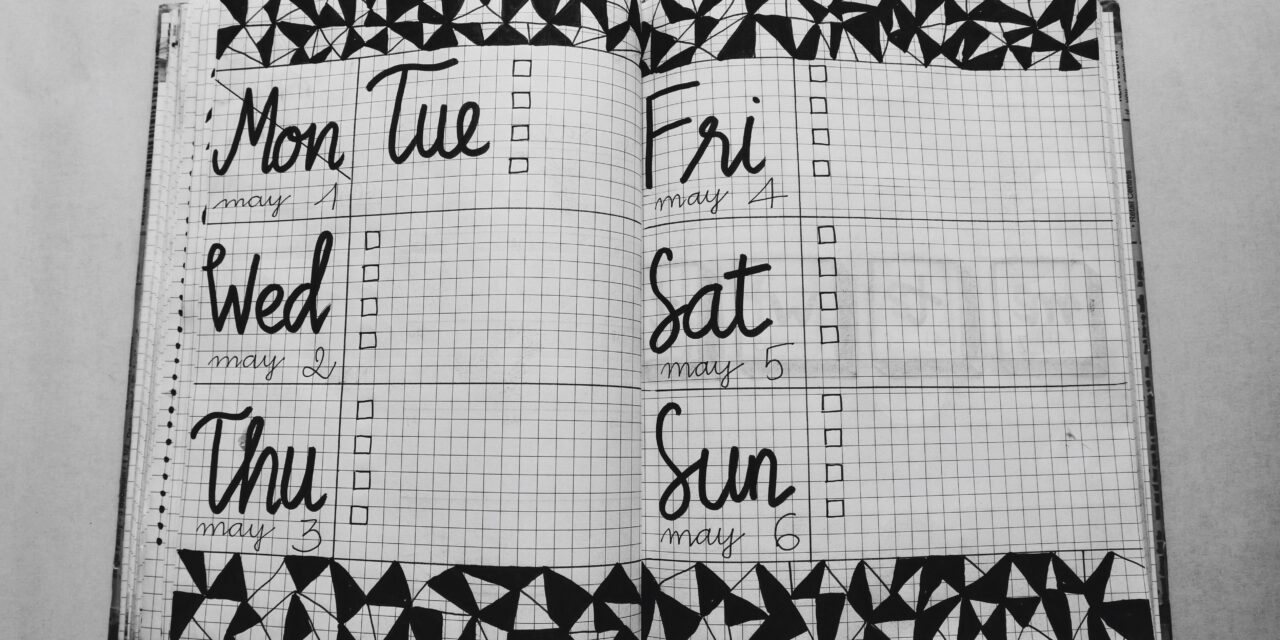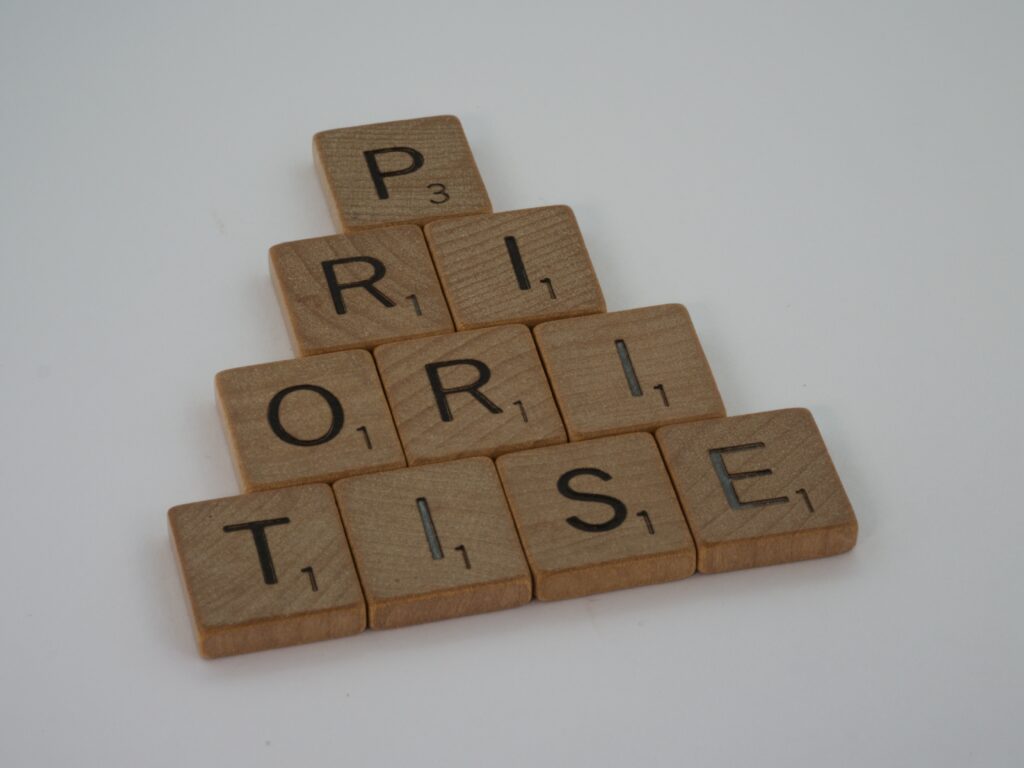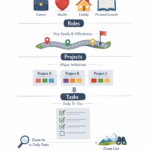
5 Reasons Why Planning Your Week is the Best Thing You Can Do

Planning your week has a multitude of benefits, and ever since I started planning my week It has changed my life significantly for the better. In a year I went from single to in a happy relationship, almost doubled my salary, relocated – moving out from my parent’s house, had two surgeries that improved my health and well-being, and put more time and effort into building up other key relationships in my life.
I attribute it mostly (if not solely) to planning my week. When I look back to before I started to plan my week I can’t believe how I ever coped. It takes me two hours, and it’s the best use of two hours I could possibly imagine.
I first decided to start planning my week when in my first job out of University. I had got to a point where I could not keep on top of my tasks and actions off the back of meetings and It felt like I had a million things on the go with no way of keeping track of any of it – or the deadlines I was supposed to be hitting.
It wasn’t such a big issue as I was generally able to quickly build and deliver on data selections and analysis at short notice. But I knew there was room for improvement in my organizational skills, which could make my life significantly easier, and stress-free, and give me more time to spend on the things I deemed important.
As per – I turned to the gods of self-help to solve my problem for me. From when I was young I can remember my Dad ingraining parts of “the 7 Habits of Highly Effective People” by Stephen Covey into mine and my sister’s minds. A book that helped him out as a young working professional too. In the chapter on time management and planning my Dad would tell me about this matrix you see below.

A recreation of a Popular Time Management Matrix as seen in “The 7 Habits of Highly Effective People“
The idea is you work mostly in Quadrant 2 (non-urgent and important) once you have resolved any tasks from Quadrant 1 (urgent and important). If you are following this matrix correctly you shouldn’t have many urgent and important matters to deal with. I knew all this already but I just couldn’t get out of Quadrant 1 long enough to stay in Quadrant 2.
After reading further, I discovered Stephen Covey’s method of planning the week – and this is what now keeps me in Quadrant 2 and makes my work life as stress-free as it can be. What I didn’t anticipate was the even bigger benefits planning my week would go on to have in my personal life.
So without rambling any further, below are all the reasons why I believe planning your week is the best thing you can do:
- Humans Can’t Control What They Remember
- Making Time For the Important Things
- Maintaining Relationships
- The Right Timeframe
- Habit Formation
“In a year I went from single to in a happy relationship, almost doubled my salary, moved out from my parent’s house, and had two surgeries that improved my health and well-being.”
1.) Humans Can’t Control What They Remember

Have you ever gone down the stairs to the Kitchen, only to forget what on earth you went for? Me too. While this doesn’t necessarily prove the above point and is not the most scientific way of putting it – I do really believe that we can’t control our thoughts, and certainly not what we remember. Otherwise, why would we ever forget anything?
Planning your week and prioritising in advance will stop you from forgetting the most important tasks you have to do that week. It helps you remember the important things without having to remember them. If you want to stop forgetting an important birthday, a big work presentation or a key goal that you never seem to have time for – planning and scheduling your week should solve it.
2.) Making Time For the Important Things

If done properly, planning your week will look at your key roles in life, and the things that are most important to you and help you to achieve the things you want. It helps you to work on important and non-urgent tasks, both professionally and in your personal life. Focusing your time on what matters specifically to you (not what other people deem important), can have a profound impact on your sense of fulfilment and happiness.
It cuts out the crap and keeps the important things front of mind. Instead of Watching another episode of Friends, or Mad Men or whatever you watch – you’re practising a skill you want to master, or seeing a friend you haven’t spent enough time with recently. Which brings me nicely to reason no. 3…
3.) Maintaining Relationships

Relationships are arguably the most important aspects of a person’s life. There’s the familiar adage “You are who you surround yourself with”, and after a study conducted over the course of people’s lives, it was found that those with the most important, cherished relationships were the happier. Link to Ted talk.
Planning your week is pivotal in maintaining relationships with the most important people in your life. It can help you not only to keep regular contact – but to put meaningful actions in to build and keep the relationship strong. It can allow you to identify upcoming milestones that you should be aware of for that person and to help the other person to know you have thought of them.
It can be easy for a person to assume you are not bothered about them or have forgotten them when instead the real truth is you’re just unorganised. So get organised and see the difference it can make. Again, this most certainly applies to both professional and personal lives.
4.) The Right Timeframe

This concept, I once again steal from the 7 Habits of Highly Effective People. But I believe it’s an important one to be aware of. Planning your week, unlike a to-do list, has the added element of scheduling in time.
A week, in my view, is the perfect timeframe in which to schedule and plan. You know roughly what is going to happen in the coming week. Most of your work meetings are set, your evening activities are decided, and you probably have a good idea of what you’re up to on the weekend. Now you can schedule around pre-existing commitments, pencil in time when you are likely to be free for the things you want to get done, and action anything you need to for upcoming events, either that week or the next.
A week is not a set timeframe that you have to stick to however, 3 days or 2 weeks could work better for you – but consider the following.
The shorter the time frame you plan in, the more you lose the ability to schedule effectively and the more frequently you have to plan. I would struggle to effectively plan all my habits, and key tasks in a three-day period. Planning also needs to be flexible to cater for things out of your control. If a day of your time gets unexpectedly taken up that’s a third of the time you’ve planned gone!
Similarly, having a longer time frame in which you plan can also bring challenges. Do you really know what’s going to happen next week or beyond? Plans are much more likely to change the further ahead you go. Can you effectively schedule an hour to devote to a work project 2 weeks ahead of time? Or is someone likely to put a meeting in, or a more urgent matter arise etc…
This isn’t to say you shouldn’t plan further ahead. Things such as birthdays, holidays, occasions and events need to be diarised – but I’m talking about key tasks and goals unique to you and your circumstances.
I find a week is the sweet spot, and makes sense given the calendar is split into weeks, but as long as it works for you I think there’s leeway on either side.
5.) Habit Formation

Planning your week is crucial in habit formation. It allows you to schedule habits for the best possible time each day, and to move them on the occasions when you have a commitment that will get in the way. Furthermore, it allows you to monitor and adjust your habits in order to give yourself the best chance of adhering to them.
Say you want to start reading more so you schedule some time before bed for this. But you realise after a week you’re always too tired. You can move it to the morning, or at lunch and adjust until you hit your desired reading goal.
Planning your week is a habit in itself, and yes I plan in time to plan my week. There is a lot to habit formation and it’s a powerful tool to allow you to be productive without taking too much willpower or brainpower. James Clear’s well-known book “Atomic Habits” is the bible for that.
Conclusion
There you have it 5 reasons why I think planning your week is one of the best things you can do. I think there’s even more to it but I will leave it there for now. Hope you find the above useful in some form!
Cheers,
Alex
















Trackbacks/Pingbacks